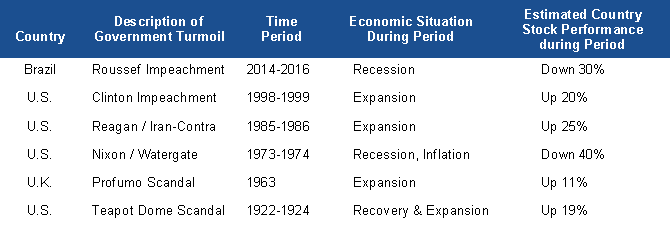Market Commentary ~ July 2017

A Crowded Summit
Major asset classes are near record levels following a rewarding first half for investors.
Source: Interactive Data Corporation
It’s the Economy
Continuing progress has occurred despite controversies here at home and abroad, and this has surprised many commentators. However, there is precedent for such market resilience. It all depends on the economy. As detailed below, even periods of significant political turmoil did not weigh on stocks during periods of economic growth. On the contrary, fallout was considerable when the economy was deteriorating.
Sources: Bloomberg, Google
It seems best to reserve judgment on the investigations of the 2016 Presidential campaign and potential fallout for financial markets. Time will tell if there was significant wrongdoing, or if this is just much ado about nothing. We can report encouraging updates of U.S. economic performance, along with improvement in Europe and Japan. Moderate growth seems likely to continue. Inflation is still low and interest rates are at attractive levels for housing and capital spending.
Health Care
In January 1961, Dwight Eisenhower famously warned of a “military-industrial complex” in his farewell address to the nation. Defense spending was almost 10% of GDP (Gross Domestic Product) in the final year of his Presidency, and he had been frustrated throughout his second term by redundancy in Pentagon budgets. What would he say about health care today? Our national health spending, only 5% of GDP in 1960, has increased in almost every ensuing year, reaching 18% in 2016. Sadly, our health outcomes – measured by statistics such as life expectancy at birth – are inferior to countries where spending has been comparatively frugal. This is neither desirable nor sustainable.
Returning to history for guidance, we find annual military spending has never exceeded 5.3% of GDP since 1990, and was 3.5% of GDP in 2016. How did we make such progress? We certainly spend much more in absolute dollars than we did sixty years ago, but the economy has grown faster, so defense’s relative share has gone down, making room for other priorities. Policymakers need to accomplish the same moderation in health care; just a slowing of growth will do wonders over time. What would this mean for your investments? While health care remains a very promising sector, Bartlett believes it will be increasingly important to focus on proven innovators delivering valuable products and services based on genuinely meaningful research, while avoiding companies whose success depends more on regular price increases.
Beware Complacency
According to The Wall Street Journal, the average daily stock market change for the second quarter was just 0.3%, which qualifies as the lowest volatility in more than half a century. We must be careful that such a prolonged period of tranquility does not induce complacency. In this regard, we offer a timely reminder about risk. The statistics summarized below are based on more than a century of data for the Dow Jones Industrial Average.
Source: American Funds
Major setbacks (20% or worse) are usually provoked by some combination of economic recession or significant interest rate increases. These threats seem unlikely during the next year. A spasm of 5-10% magnitude is more probable, and would surely be sensationalized by the media. By always keeping investment policy safeguards in place – thoughtful asset allocation, careful diversification, and cash reserves for withdrawal requirements – such dislocations can be viewed as buying opportunities rather than periods of alarm.
Concluding Comments
We hope you will recommend Bartlett to family, friends, and colleagues who could benefit from our investment management and financial planning services.




